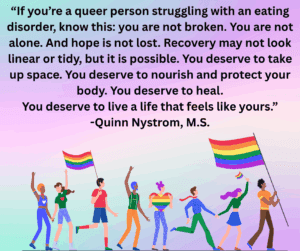Please note that this is an Archived article and may contain content that is out of date. The use of she/her/hers pronouns in some articles is not intended to be exclusionary. Eating disorders can affect people of all genders, ages, races, religions, ethnicities, sexual orientations, body shapes, and weights.
By Quinn Nystrom, MS
LGBTQ+ folks are at greater risk for eating disorders than cisgender, heterosexual people — and that’s not a coincidence. It’s the result of navigating a world that, too often, sends the message that who we are is “too much,” “not enough,” or just plain wrong. That kind of hostile environment plants seeds of shame. And from that shame, eating disorders can grow.
For some queer folks, an eating disorder becomes a kind of refuge — a way to regain control, to quiet the noise, to shrink oneself in a world that feels dangerous or invalidating. But here’s the hard truth: while it may feel like a haven at first, the eating disorder is not your ally. It doesn’t protect your authenticity — it erodes it. It thrives on shame and reinforces the lie that you don’t deserve care, nourishment, or joy.
 That lie is influential. But it is a lie.
That lie is influential. But it is a lie.
The truth is that you do deserve it. You deserve safety. You deserve to show up as your whole self. And you deserve recovery.
So, what does it mean to recover, especially for LGBTQ+ individuals whose relationships with their body, food, and identity are deeply nuanced?
To me, recovery is about taking up space — not just physically but emotionally, socially, and spiritually. Taking up space means showing up as your authentic self in a world that often tries to erase or flatten your complexity. It means finding belonging with people who see you, affirm you, and speak your language. It means building relationships — including with providers — who don’t expect you to fit into a one-size-fits-all treatment model.
We need providers who know (or are willing to learn) that LGBTQ+ people are not a monolith. That gender euphoria is not at odds with recovery. That body and gender are intertwined in ways that defy binary thinking. That “health” and “normal” look different across communities — and that’s not a flaw. It’s a reality worth respecting.
And if you’re a provider reading this, your role matters. You are a stakeholder in the collective effort to make recovery more accessible, inclusive, and just. That means listening deeply, staying curious, and being willing to unlearn what doesn’t serve the communities you support.
If you’re a queer person struggling with an eating disorder, know this: you are not broken. You are not alone. And hope is not lost. Recovery may not look linear or tidy, but it is possible. You deserve to take up space. You deserve to nourish and protect your body. You deserve to heal.
You deserve to live a life that feels like yours.
Click here to learn more about LGBTQ+ treatment at Center for Change
















